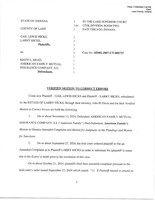The Law Office of Attorney John H. Davis Files Fraud Lawsuit against Alabama Judges and State Officials in Indiana Northern District Court
MERRILLVILLE, Ind., Oct. 8, 2020 /PRNewswire/ -- The Law Office of Attorney John H. Davis filed a Complaint against Alabama judges and state officials on July 14, 2020 where the 2020-case, Davis et al v. Limestone County Department of Human Resources et al., (#2:20-cv-266) sets forth criminal and civil allegations allegedly committed by Alabama defendants including fraud and RICO naming several Alabama defendants previously listed as defendants in an earlier 2016-case, Davis et al v. Anderson et al. (#2:16-cv-120), filed April 2016 but subsequently dismissed with prejudice in March 2017 by Judge Phillip P. Simon under Federal Rules of Civil Procedure 8 and 10 even though these Rules do not appear to provide federal judges authority to summarily dismiss entire Complaints.
This first case was appealed to the 7th Circuit (Chicago, Illinois) through plaintiffs' attorney (John H. Davis) which led to a document alleging he filed the appeal in a pro se manner – this allegation surfaced two (2) weeks after making oral arguments before a judicial panel (Sykes-Easterbrook-Bauer). Davis challenged it. To date, the 7th Circuit has not produced any document which represents Davis' filing in a pro se manner nevertheless the Circuit disbarred him, oddly leaving the matter still to be resolved.
https://mma.prnewswire.com/media/808945/JOHN_DAVIS___motion_to_reconsider.pdf?p=original
The second case describes harms committed allegedly by Alabama defendants affecting Indiana plaintiffs via the long–armed jurisdictional statute. Some defendants filed responsive pleadings suggesting that Rooker-Feldman case law protects Alabama judges through immunity – and that plaintiffs are just dissatisfied with a state judgment. Even though immunity protects judges who act lawfully in an official capacity, plaintiffs believe no immunity exists for judges accused of criminal acts and these judgments, when secured by fraud, are believed to be void (See contract law).
Recently, another layer of guardianship fraud involving federally protected funds was believed to be discovered in Alabama. The likelihood of multi-layered, multi-official, interstate, complex fraud schemes (i.e. mail fraud, forgery, wire fraud) may have possibly affected the ability of these Alabama officials to make sound jurisdictional decisions. Hopefully undue influence will not interfere in the second case. The U.S. Senate Special Committee on Aging recognizes the impact of guardianship on well-being of seniors and people with disabilities. Their November 2018 Guardianship Report states:
"Unscrupulous guardians acting with little oversight have used guardianship proceedings to obtain control of vulnerable individuals and have then used that control to liquidate assets and savings for their own personal benefit … In order to protect individuals subject to guardianship from abuse, exploitation, and neglect, governments and courts must be vigilant in their enforcement of laws and procedures that provide oversight of these relationships."
https://www.aging.senate.gov/imo/media/doc/Guardianship%20Report.pdf
Special thanks to these U.S. Senators for their published work: (Collins-MA)(Hatch-UT)(Flake-AZ)(Scott-SC)(Tillis-NC)(Corker-TN)(Burr-NC)(Rubio-FL)(Fischer-NE)(Cassey-PA)(Nelson-FL)(Gillibrand-NY)(Blumenthal-CT)(Donnelly-IN)(Warren-MA)(Masto-NV)(Jones-AL)
Both Alabama cases seem to overlap three (3) others brought by Davis' former client (Bennie Kennedy) who filed fraud lawsuits against Prairie State College (Illinois), Schneider Electric, Schneider Electric's Chicago's law firm (Franczek-Radelet), Schneider Electric's attorneys (MaryAnn McLean, David Radelet, Staci Rotman and Jeffrey Nowak).
https://mma.prnewswire.com/media/944806/NewFraudComplaintAgainstSchneider.pdf?p=original
The common denominator is a district magistrate judge (Paul R. Cherry) who appeared to adversely affect these cases. On 08/17/20 in Schneider Electric's Case#2:12-cv-122, Judge Joseph Van Bokkelen's Opinion indicated an unwillingness to "disturb" Cherry's previous decision. In 2017 this case was earlier appealed. The 7th Circuit's June 2018 Opinion indicated that appellate review of Cherry's decision was only for "abuse of discretion" not "de novo".
Federal Rule of Civil Procedure 9 suggests higher standards when alleging fraudulent acts committed by defendants by differentiating these acts from harmless errors or mistakes. What is not clear is whether or not it is possible to allege fraudulent acts successfully, especially when favorable judgments – allegedly secured through fraud – are not seriously examined. Proving fraud is never easy. It is not for faint hearts. It causes strain while exhausting resources – particularly when evidentiary processes are prematurely thwarted.
Despite setbacks however the American spirit of law prevails. It is believed when proper application of the rule of law exists, respect for our courts and governments increase around the world. Simply stated, when ordinary voices are heard, indeed our democracy works.
SOURCE Attorney John H. Davis & Associates

WANT YOUR COMPANY'S NEWS FEATURED ON PRNEWSWIRE.COM?
Newsrooms &
Influencers
Digital Media
Outlets
Journalists
Opted In


Share this article